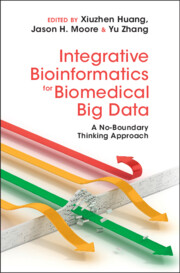Book contents
- Integrative Bioinformatics for Biomedical Big Data
- Integrative Bioinformatics for Biomedical Big Data
- Copyright page
- Dedication
- Contents
- Contributors
- 1 No-Boundary Thinking
- 2 Artificial Intelligence Approaches to No-Boundary Thinking
- 3 No-Boundary Thinking in Undergraduate Bioinformatics Education
- 4 No-Boundary Course Developments
- 5 No-Boundary Thinking for Transcriptomics and Proteomics Big Data
- 6 Pharmacogenomics
- 7 The Ethical Status of an AI
- 8 Computational Thinking and No-Boundary Thinking
- 9 Carving Nature at the Joints: Which Joints?
- Index
- References
7 - The Ethical Status of an AI
Published online by Cambridge University Press: 14 September 2023
- Integrative Bioinformatics for Biomedical Big Data
- Integrative Bioinformatics for Biomedical Big Data
- Copyright page
- Dedication
- Contents
- Contributors
- 1 No-Boundary Thinking
- 2 Artificial Intelligence Approaches to No-Boundary Thinking
- 3 No-Boundary Thinking in Undergraduate Bioinformatics Education
- 4 No-Boundary Course Developments
- 5 No-Boundary Thinking for Transcriptomics and Proteomics Big Data
- 6 Pharmacogenomics
- 7 The Ethical Status of an AI
- 8 Computational Thinking and No-Boundary Thinking
- 9 Carving Nature at the Joints: Which Joints?
- Index
- References
Summary
This chapter explores the ethical status of a presumed artificially intelligent machine (AI) and the grounds for such status from the perspective of ethical philosophy. The chapter explicitly repudiates anthropocentric claims for an AI or assumptions about its capabilities or motivations for its existence or actions. It also avoids any speculation about whether or when AI capabilities may come about. Instead, it provides a framework for building the vocabulary and concepts for analysis of important ethical issues for AI from first principles. The philosophical foundations of ethics considered here are nihilism, divine command, consequentialism, deontology, and virtues ethics.
- Type
- Chapter
- Information
- Integrative Bioinformatics for Biomedical Big DataA No-Boundary Thinking Approach, pp. 135 - 146Publisher: Cambridge University PressPrint publication year: 2023

